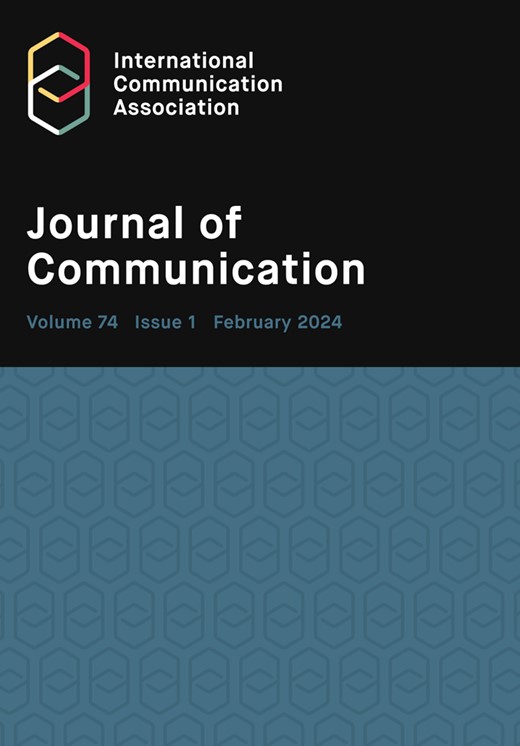Influence of Media Framing on Public Perception of Climate Change
IF 6.1
1区 文学
Q1 COMMUNICATION
引用次数: 0
Abstract
Purpose: The objective of this study was to examine the influence of media farming on public perception of climate change. Methodology: The study adopted a desktop research methodology. Desk research refers to secondary data or that which can be collected without fieldwork. Desk research is basically involved in collecting data from existing resources hence it is often considered a low cost technique as compared to field research, as the main cost is involved in executive’s time, telephone charges and directories. Thus, the study relied on already published studies, reports and statistics. This secondary data was easily accessed through the online journals and library. Findings: The findings reveal that there exists a contextual and methodological gap relating to the influence of media farming on public perception of climate change. Preliminary empirical review revealed that media framing significantly influenced public perception of climate change by shaping how individuals understood and engaged with the issue. It found that threat-based frames dominated coverage, often leading to feelings of helplessness and disengagement. The diversity of media outlets resulted in varied framing techniques, contributing to polarized opinions and confusion. Visual imagery also played a crucial role, often reinforcing existing narratives and sometimes oversimplifying complex issues. The study highlighted the need for balanced, scientifically informed, and diverse media coverage to foster a more accurate and cohesive public understanding of climate change. Unique Contribution to Theory, Practice and Policy: The Agenda-Setting Theory, Framing Theory and Cultivation Theory may be used to anchor future studies on media framing. The study recommended advancing theoretical models to understand media framing's effects on public perception, encouraging media organizations to adopt balanced climate change coverage, and fostering collaboration between scientists and media professionals. It emphasized the need for policy guidelines to ensure accurate reporting, advocated for incorporating media literacy in education to enhance critical analysis of media messages, and suggested funding public awareness campaigns with scientifically accurate content. These recommendations aimed to improve public understanding and engagement with climate change, supporting informed decision-making and proactive climate action.媒体框架对公众气候变化认知的影响
目的:本研究旨在探讨媒体农业对公众气候变化认知的影响。研究方法:本研究采用案头研究方法。案头研究指的是二手数据或无需实地考察即可收集到的数据。案头研究基本上是从现有资源中收集数据,因此,与实地研究相比,案头研究通常被认为是一种低成本技术,因为主要成本涉及执行人员的时间、电话费和目录。因此,本研究依赖于已出版的研究、报告和统计数据。这些二手数据可通过在线期刊和图书馆轻松获取。研究结果:研究结果表明,在媒体宣传对公众气候变化认知的影响方面,存在着背景和方法上的差距。初步实证审查显示,媒体框架通过影响个人对气候变化问题的理解和参与,极大地影响了公众对气候变化的看法。研究发现,以威胁为基础的框架在报道中占主导地位,往往导致无助感和脱离感。媒体渠道的多样性导致了不同的框架技术,造成了两极分化的观点和混乱。视觉图像也发挥了至关重要的作用,往往强化了现有的叙述,有时将复杂的问题过于简单化。这项研究强调,需要平衡、有科学依据和多样化的媒体报道,以促进公众更准确、更一致地理解气候变化。对理论、实践和政策的独特贡献:议程设置理论、框架理论和培养理论可用于未来的媒体框架研究。研究建议推进理论模型,以了解媒体框架对公众认知的影响,鼓励媒体机构采用平衡的气候变化报道,并促进科学家和媒体专业人员之间的合作。研究强调需要制定政策指南以确保报道的准确性,倡导将媒体素养纳入教育以加强对媒体信息的批判性分析,并建议资助内容科学准确的公众宣传活动。这些建议旨在提高公众对气候变化的理解和参与,支持知情决策和积极的气候行动。
本文章由计算机程序翻译,如有差异,请以英文原文为准。
求助全文
约1分钟内获得全文
求助全文
来源期刊

Journal of Communication
COMMUNICATION-
CiteScore
11.60
自引率
5.10%
发文量
41
期刊介绍:
The Journal of Communication, the flagship journal of the International Communication Association, is a vital publication for communication specialists and policymakers alike. Focusing on communication research, practice, policy, and theory, it delivers the latest and most significant findings in communication studies. The journal also includes an extensive book review section and symposia of selected studies on current issues. JoC publishes top-quality scholarship on all aspects of communication, with a particular interest in research that transcends disciplinary and sub-field boundaries.
 求助内容:
求助内容: 应助结果提醒方式:
应助结果提醒方式:


